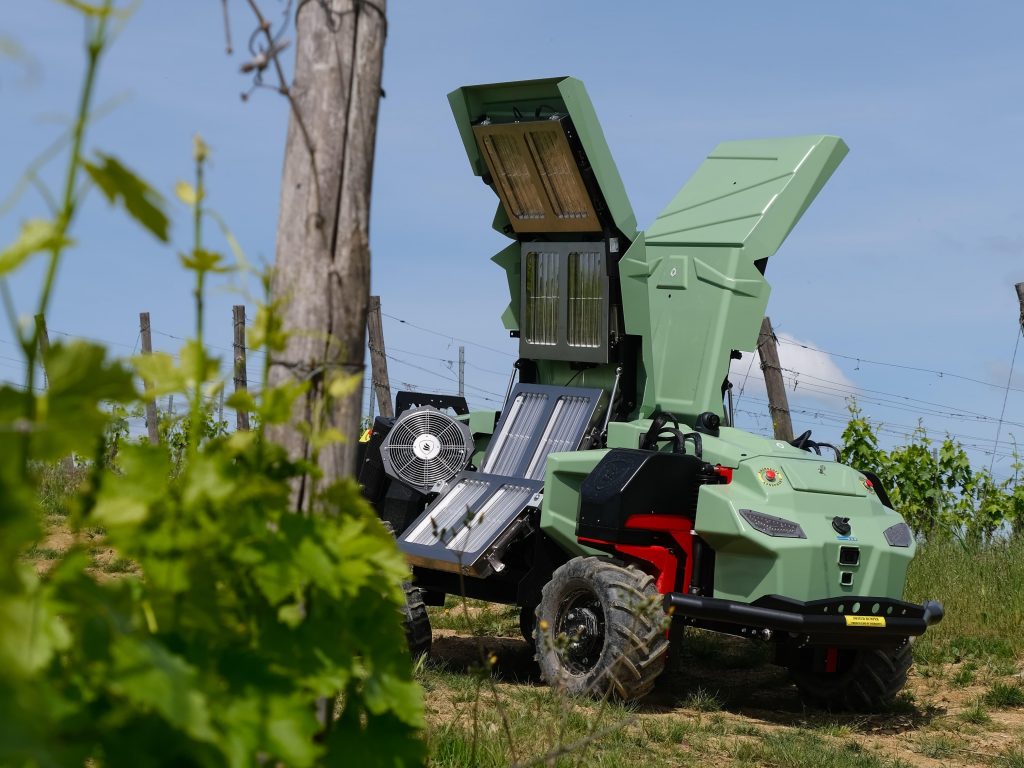The Piccini Winery, a fifth-generation family-owned estate at home in the heart of Italian wine region Chianti Classico, is merging tradition with forward-thinking technology.
Under the leadership of CEO Mario Piccini, who joined his family’s historic winery in 1982 on its centenary, the company has partnered with manufacturer Free Green Nature to introduce Icaro X4, a solar-powered robot for vineyard care.
When Piccini stepped into his leadership role, he recognized both opportunity and duty. “I felt a profound responsibility to safeguard the family legacy, a heritage built over five generations, while equipping our team to meet tomorrow’s challenges,” he explains.
Inspired by landmark research on AI and precision viticulture, which demonstrated how data-driven decisions can dramatically improve vine health and yield, the Piccini team viewed robotics not as an intrusion but as a powerful ally in preserving terroir.
The Innovation Behind Icaro X4
What makes this initiative remarkable is the sophisticated technology behind the robot. “Icaro X4 is essentially our 24/7 vineyard sentinel,” Piccini describes.
Before deployment, each parcel is mapped with centimeter-by-centimeter precision, defining treatment plans that allow Icaro to work even without a satellite signal. The robot’s foldable panels, mounted on electric-actuated wings, lower to within centimeters of grapevine leaves, emitting germicidal UV-C rays that disrupt fungal DNA and stimulate the vine’s own defenses.
A hybrid powertrain enables Icaro to work up to 72 hours continuously, even during rain when downy mildew risk peaks. Additionally, environmental sensors feed real-time wind, humidity and solar irradiance data back to the base station, which boasts a predictive algorithm that determines exactly when and where Icaro should intervene.
Icaro’s abilities have transformed how Piccini manages grape health. “Machine-learning models process multispectral sensor data to predict fungal outbreaks before symptoms appear, guiding Icaro’s UV-C applications with surgical precision,” Piccini notes. The UV-C exposure not only inactivates pathogens like powdery and downy mildew but also induces vines to produce natural phytoalexins—an antifungal defense—bolstering their immune response in ways no chemical spray can match, according to Piccini.
True sustainability for Piccini means “closing the loop on energy and resource use.” Icaro’s base stations are equipped with panels that turn sunlight into electricity to recharge batteries, ensuring continuous monitoring without fossil fuel dependence. Piccini says the robot reduces fungicide reliance by up to 70%, cutting carbon dioxide and chemical inputs—an outcome aligned with the EU’s comprehensive food policy framework, Farm to Fork, to halve pesticide use by 2030.
“By marrying solar-powered data collection with UV-C treatment, we preserve soil health, protect beneficial insects and uphold the purity of our organic certification,” Mario explains. He says this proactive, non-chemical strategy has raised quality-control standards, resulting in fewer crop losses, more consistent phenolic ripeness and wines that authentically express Chianti Classico terroir.
Italian Wine, Balancing Innovation With Tradition
The integration of advanced robotics into a centuries-old craft presented unique challenges, particularly with getting everyone on board with an untested method. Piccini’s team tackled this by staging hands-on workshops, pairing veteran agronomists with robotics engineers to co-develop protocols that honored both viticultural wisdom and technological best practices.
“Balancing innovation with tradition means every technological adoption must respect the character of our Sangiovese grapes and the rhythms of Chianti Classico,” says Piccini. To ease into the new functionality, the winery pilots new tools on limited plots—first five hectares with Icaro, with plans to scale to 15—which allows the team to learn, adapt and “maintain artisanal control” at every step.
Logistical challenges, like mapping steep slopes, are resolved through iterative field trials, while the shift in team skill sets has empowered the human workforce to oversee fleets of robots rather than just drive tractors.
Market Response And Academic Recognition
The tech-forward approach has resonated strongly with modern consumers who increasingly seek responsibility credentials alongside authenticity in their wines, says Piccini. A Wine Market Council study of over 1,500 U.S. wine drinkers found that 35% regularly or occasionally buy sustainable wine. According to Wine Business Monthly, Dr. Liz Thach, MW, president of the Council, said the top reason consumers choose eco-friendly wines is to “support the farmers and producers behind them.”
Piccini says early feedback shows that wine lovers appreciate knowing each bottle reflects both ancestral terroir and cutting-edge care, reinforcing the family winery’s commitment to innovate while staying true to its roots. Looking ahead, Piccini sees AI and robotics becoming as integral to a winery as oak barrels and steel fermenters.
There is further evidence that more vine growers will adopt new technology. A recent study from the Italian university Politecnico di Torino found that manual pruning can account for up to 25% of annual labor costs in grape production. Researchers note that due to terrain and cost challenges, large-scale machines are often impractical, prompting research into compact, robotic pruning solutions.
“Research into autonomous pruning robots, like quadruped platforms outfitted with computer-vision systems, is well underway in academic circles and could revolutionize winter work in the vineyard,” Piccini observes. The authors of the Politecnico di Torino report agree, concluding that progress lies in combining agronomy, robotics and AI to enable smarter, more sustainable agriculture.
Piccini believes that technology will empower his team to elevate quality, sustainability and the expression of the winery’s unique Chianti Classico Italian wine terroir, “ensuring [the] family legacy thrives for generations to come.”

